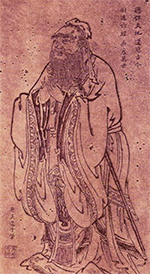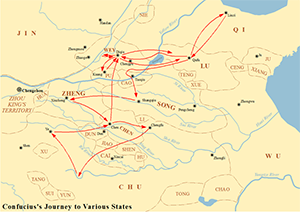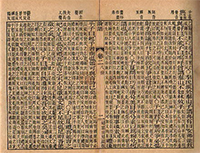The Chinese Sage Confucius
Confucius is one of the most famous philosophers and teachers of ancient times. His life and teachings, devoted to self-cultivation, have inspired people from his time to the present day. 
The years of his life are generally thought to have been 551 B.C. to 479 B.C. His birth name was Kong Qiu (孔夫子), and he is often referred to as Kongzi or Kongfuzi in Chinese sources. The Latinization of Kongfuzi is Confucius. Some sources say that he was born into a royal family; other sources say that he grew up in poverty. He grew up in the city of Qufu and was most well-known as living in the state of Lu, which is now Shandong. Qiu's father died when the boy was 3, and he learned from his mother, who instilled in him a great desire to learn. He was 23 when she died, and he followed tradition by mourning her for three years. He had married when he was 19, to a woman named Qiguan. They had three children together. Confucius had a career in government, from which he observed the inner workings of the officials of the State of Lu. He served as Director of Public Works and Director of the Justice Department. He was well-known as a teacher. His educational philosophy focused on the Six Arts: archery, calligraphy, chariot-driving, computation, mathematics, and ritual. He practiced self-discipline and implored his pupils to do the same. He taught for more than 40 years and is thought to have had more than 3,000 pupils. He did not charge a fee but asked only a small gift of food in exchange for imparting his wisdom, which focused on following the teachings of the ancients. Overall, he insisted on the importance of what he considered the four most important virtues: benevolence, moral wisdom, observance of rites, and righteousness. 
Disillusioned with the current ruler, he left Lu and traveled through eight other Chinese states: Wey, Song, Zheng, Cao, Chu, Qi, Chen, and Cai. He found willing audiences for his teachings during this self-imposed exile. He stayed away 12 years and returned home when he was 68. One of his most famous interactions was with Taoism founder Lao-Tzu. In his last years, he was busy writing and editing, his own works and those of others. He died in 479, when he was 73. A collection of his political beliefs emerged as the book Lunyu, known in English as the Analects. 
Confucius believed in the rule of law, as conceived by just rulers acting morally and subjects following those laws because they were beneficial to society. He said, "Heaven does not have two suns and the people do not have two kings." In the same vein, he had this to say, "If the people be led by laws, and uniformity sought to be given them by punishments, they will try to avoid the punishment, but have no sense of shame. If they be led by virtue, and uniformity sought to be given them by the rules of propriety, they will have the sense of the shame, and moreover will become good." He was said to be the author and/or editor of the Five Classics:
The Spring and Autumn Annals gave rise to the name for the period; thus, part of the latter reign of the Eastern Zhou Dynasty is called the Spring and Autumn period. Among the many famous statements and teachings attributed to Confucius was what has come to be known as the Golden Rule: "What you do not wish for yourself, do not do to others." (It is sometimes called the Silver Rule because it is a negative construction.) Other famous sayings of Confucius:
|
|
Social Studies for Kids
copyright 2002–2026
David White




